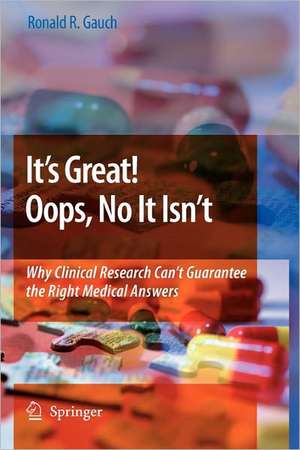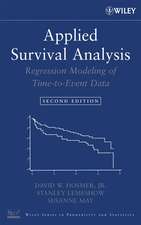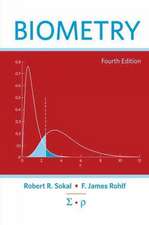It’s Great! Oops, No It Isn’t: Why Clinical Research Can’t Guarantee The Right Medical Answers.
Autor Ronald Gauchen Limba Engleză Paperback – 19 oct 2010
| Toate formatele și edițiile | Preț | Express |
|---|---|---|
| Paperback (1) | 716.65 lei 6-8 săpt. | |
| SPRINGER NETHERLANDS – 19 oct 2010 | 716.65 lei 6-8 săpt. | |
| Hardback (1) | 723.78 lei 6-8 săpt. | |
| SPRINGER NETHERLANDS – 6 noi 2008 | 723.78 lei 6-8 săpt. |
Preț: 716.65 lei
Preț vechi: 754.36 lei
-5% Nou
Puncte Express: 1075
Preț estimativ în valută:
137.14€ • 142.31$ • 114.63£
137.14€ • 142.31$ • 114.63£
Carte tipărită la comandă
Livrare economică 17-31 martie
Preluare comenzi: 021 569.72.76
Specificații
ISBN-13: 9789048180233
ISBN-10: 9048180236
Pagini: 312
Ilustrații: XIII, 298 p.
Dimensiuni: 155 x 235 x 16 mm
Greutate: 0.44 kg
Ediția:Softcover reprint of hardcover 1st ed. 2009
Editura: SPRINGER NETHERLANDS
Colecția Springer
Locul publicării:Dordrecht, Netherlands
ISBN-10: 9048180236
Pagini: 312
Ilustrații: XIII, 298 p.
Dimensiuni: 155 x 235 x 16 mm
Greutate: 0.44 kg
Ediția:Softcover reprint of hardcover 1st ed. 2009
Editura: SPRINGER NETHERLANDS
Colecția Springer
Locul publicării:Dordrecht, Netherlands
Public țintă
Professional/practitionerCuprins
Medical Research Explained.- Medical Research – Searching for Answers.- The Case-Control Method – Looking Backwards.- The Cohort Study – Watchful Waiting.- The Clinical Trial –The Gold Standard.- Comparing the Methods – Qualitative Differences.- Understanding the Clinical Trial.- The Protocol – The Guiding Light.- The Control Group – Leveling the Playing Field.- Measurements – They'ever Exact.- Bias Control – A Closer Look at Blinding and Randomization.- Utility – Are Clinical Trial Results Useful?.- Research Discrimination – Inadequately Tested Populations.- Seven Deadly Flaws – The Clinical Trials' Achilles' Heel.- Tools of the Trade.- Statistics – Was the Finding Significant?.- Analysis Issues – A Lot of Choices.- Meta Analysis – An Alternative to Large Trials.- The Real World.- Research Results That Clashed – What's the Right Answer?.- Hormone Replacement Therapy – The Silver Bullet That Misfired.- Publishing – Getting the Word Out to Doctors.- The Public Forum – Sharing the News with the Public.- Product Development – Getting Discoveries to the Market.- Medical Innovations – Regulators, Resources and Results.- Science and Politics – A Troubling Mixture.- Research Misconduct – Irresistible Temptation.- Postmarketing Surveillance – An Imperfect System.- Regulatory Reform – Changes Needed.- Journey's End – A Call for Action.
Recenzii
From the reviews:
“Written by someone well versed in the complexities of biomedical research, this easy to understand book provides valuable information on the difficulty of finding the truth about drug safety and efficacy. (Dr.) Gauch has done us all a great service by explaining in a lucid and insightful manner why we need to be cautious in interpreting the results of preliminary, unconfirmed, or less than definitive clinical trials. This book is must reading not only for those involved in biomedical research, health care professionals, students and disease related society members but for the general public as well.” (Stuart D. Cook, M.D. Past President, University of Medicine and Dentistry of New Jersey - currently the Ruth Dunietz Kushner and Michael Jay Serwitz Professor of Neurology and Neurosciences at the University)
Press Release:
Heidelberg, 8 October 2008
It's Great! Oops, No It Isn't
New book explains why correct answers in medical research are so hard to achieve
The truth is, few people know the first thing about clinical research. The public reads about a medical research project that announces unbelievable results for a miraculous drug. Some years later, another investigation completely wipes out those initial favorable findings. For example, a 1994 headline in the San Francisco Chronicle announced "Hormones cut women's risk of heart disease" but by 2001 that optimistic report was reversed as evidenced by a Washington Post article titled, "Hormones don't protect women from heart disease."
People are confused because they do not understand the process behind these conflicting results. A new book can help - It's Great! Oops, No It Isn't: Why Clinical Research Can't Guarantee The Right Medical Answers by Ronald Gauch dissects medical research methodology. Through a penetrating inquiry into its triumphs and tragedies, it explains why correct answers are so hard toachieve. What emerges from this inquiry is the unexpected and stunning conclusion that medical researchers can never be sure that they've ended up with a truthful answer. Gauch shows readers why the quest for knowledge through clinical trials is fraught with problems that even the best researchers cannot overcome.
A fascinating gallery of cases illustrates the perils investigators face. Particular emphasis is given to the "clinical trial," the so-called gold standard for medical research. Its seven fatal flaws show succinctly why getting the right research answer is so problematic. In example after example, the author challenges the notion that medical research is too complex for the average citizen to comprehend.
Understanding the imperfect world of clinical research allows the reader to step up and begin to ask his or her own questions, to challenge conclusions, to have doubts and not be afraid to raise them. People who care about their health and the health of others should not be innocent bystanders. They have a right, maybe even an obligation, to become involved. After all, it's their health that is at stake.
Ronald Gauch, Ph.D., spent most of his adult life involved in the application of research methods to clinical investigations. He has been a primary player in important medical studies of major pharmaceutical companies. He has also seen the research world from the academic side at Marist College. He is an excellent presenter, winner of a number of speaking competitions and awarded best teacher recognition on two occasions while at Marist College. As a consultant to the pharmaceutical and healthcare industries, and working with a number of local health-related organizations, he is involved with both the academic and practical world of medical research.
The author is available for interview.
Ronald R. Gauch
It's Great! Oops, No It Isn't
Why Clinical Research Can't Guarantee The Right Medical Answers
2008. XIV, 298 pages.
Hardcover €39.95, $59.95, £31.99
ISBN 978-1-4020-8906-0
Contact:
Joan Robinson
tel +49-6221-4878130 (Germany)
"It’s Great!Oops, No It Isn’t offers a behind-the-study look at how medical research is actually conducted, from the first protocol design to publication of the results. … Gauch’s book should be a must-read for anyone considering participating in a clinical trial." (Miller-McCune Turning Research into Solutions, March, 2009)
“Written by someone well versed in the complexities of biomedical research, this easy to understand book provides valuable information on the difficulty of finding the truth about drug safety and efficacy. (Dr.) Gauch has done us all a great service by explaining in a lucid and insightful manner why we need to be cautious in interpreting the results of preliminary, unconfirmed, or less than definitive clinical trials. This book is must reading not only for those involved in biomedical research, health care professionals, students and disease related society members but for the general public as well.” (Stuart D. Cook, M.D. Past President, University of Medicine and Dentistry of New Jersey - currently the Ruth Dunietz Kushner and Michael Jay Serwitz Professor of Neurology and Neurosciences at the University)
Press Release:
Heidelberg, 8 October 2008
It's Great! Oops, No It Isn't
New book explains why correct answers in medical research are so hard to achieve
The truth is, few people know the first thing about clinical research. The public reads about a medical research project that announces unbelievable results for a miraculous drug. Some years later, another investigation completely wipes out those initial favorable findings. For example, a 1994 headline in the San Francisco Chronicle announced "Hormones cut women's risk of heart disease" but by 2001 that optimistic report was reversed as evidenced by a Washington Post article titled, "Hormones don't protect women from heart disease."
People are confused because they do not understand the process behind these conflicting results. A new book can help - It's Great! Oops, No It Isn't: Why Clinical Research Can't Guarantee The Right Medical Answers by Ronald Gauch dissects medical research methodology. Through a penetrating inquiry into its triumphs and tragedies, it explains why correct answers are so hard toachieve. What emerges from this inquiry is the unexpected and stunning conclusion that medical researchers can never be sure that they've ended up with a truthful answer. Gauch shows readers why the quest for knowledge through clinical trials is fraught with problems that even the best researchers cannot overcome.
A fascinating gallery of cases illustrates the perils investigators face. Particular emphasis is given to the "clinical trial," the so-called gold standard for medical research. Its seven fatal flaws show succinctly why getting the right research answer is so problematic. In example after example, the author challenges the notion that medical research is too complex for the average citizen to comprehend.
Understanding the imperfect world of clinical research allows the reader to step up and begin to ask his or her own questions, to challenge conclusions, to have doubts and not be afraid to raise them. People who care about their health and the health of others should not be innocent bystanders. They have a right, maybe even an obligation, to become involved. After all, it's their health that is at stake.
Ronald Gauch, Ph.D., spent most of his adult life involved in the application of research methods to clinical investigations. He has been a primary player in important medical studies of major pharmaceutical companies. He has also seen the research world from the academic side at Marist College. He is an excellent presenter, winner of a number of speaking competitions and awarded best teacher recognition on two occasions while at Marist College. As a consultant to the pharmaceutical and healthcare industries, and working with a number of local health-related organizations, he is involved with both the academic and practical world of medical research.
The author is available for interview.
Ronald R. Gauch
It's Great! Oops, No It Isn't
Why Clinical Research Can't Guarantee The Right Medical Answers
2008. XIV, 298 pages.
Hardcover €39.95, $59.95, £31.99
ISBN 978-1-4020-8906-0
Contact:
Joan Robinson
tel +49-6221-4878130 (Germany)
"It’s Great!Oops, No It Isn’t offers a behind-the-study look at how medical research is actually conducted, from the first protocol design to publication of the results. … Gauch’s book should be a must-read for anyone considering participating in a clinical trial." (Miller-McCune Turning Research into Solutions, March, 2009)
Caracteristici
Tells consumers precisely why medical researchers can’t promise that their investigations produced a correct finding by exposing sources of errors that go beyond the researcher’s control Explains why the path drugs must travel as they make their way through the development phase and onto the market is flawed Describes the pitfalls that occur when publishing and communicating medical research results to the medical profession and the public Offers ways to improve the current systems of approving and monitoring drugs Provides the information patients, physicians and healthcare professionals need so their interests and concerns are heard by the medical research community















